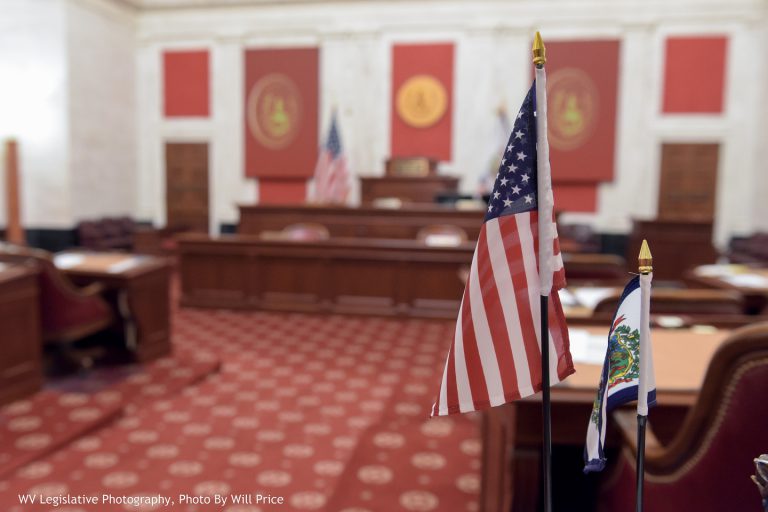Completed Legislation
House Bill 2077 removes the requirement that the Joint Committee on Government and Finance be given reports on the Colin Anderson closure and relocation of its patients. The Colin Anderson Center, a state mental health hospital and facility, was closed December 31, 1996, and its patients were either transferred or deinstitutionalized. Current State Code directs the Secretary of the Department of Health and Human Resources to submit monthly reports to the Legislature’s Joint Committee on Government and Finance pertaining to the placement and monitoring of all residents transferred from the Colin Anderson Center.
House Bill 2778 continues the West Virginia State Police until July 1, 2004. The West Virginia State Police are responsible for state law enforcement involving both criminal and traffic activity including crime scene investigation, traffic crash investigation, court testimony, report writing, etc. and to provide efficient police service to the citizens of West Virginia.
House Bill 2803 would allow the Board of Barbers and Cosmetologists to continue until July, 1 2008. The Board regulates the barbering and cosmetology professions.
House Bill 2094 regulates the release of fish, water animals and other aquatic organisms into the waters of West Virginia. This measures makes it unlawful to release any fish, water animal or other aquatic organism into the public waters of this state without first obtaining a permit from the Division of Natural Resources. However, the bill allows the release of trout originating in West Virginia or imported as long as the imported trout meet the disease free certification requirements set forth by state code. Additionally, bass which meet the disease free certification requirements may also be released without a stocking permit.
House Bill 2301 provides, through a maintenance bond, funding for necessary care of animals seized because of allegations of neglect. Under this bill, owners whose animals are seized must post a maintenance bond within five days for the reasonable and necessary care of their animal pending a hearing.
House Bill 2359 allows all of the fees collected for required inspections done by the Office of the State Fire Marshal and for license fees for electricians and electrical inspectors to be kept in a special revenue account, instead of having 10% of the fees transferred to the General Revenue Fund. It also would require that the tax on insurance companies which provide fire insurance be deposited in that account.
House Bill 2500 clarifies that courts may continue orders of protection in relation to domestic violence while certain court proceedings are pending. The bill allows this continuation of an order of protection during the pendency of divorce, separate maintenance or annulment.
House Bill 2556 requires the Insurance Commissioner to issue an annual communication to state and local governmental entities and nonprofit organizations to increase awareness of certain flood insurance issues. The bill ensures state and local governmental entities and nonprofit organizations are aware of the 1988 amendments to the federal Robert T. Stafford Emergency Assistance and Disaster Relief Act. This Act imposes penalties in the form of reductions in Federal Emergency Management Agency (FEMA) disaster relief funds on public entities who fail to purchase adequate flood insurance on all property located in identified flood hazard areas. It also considers the magnitude of risk exposure and potential financial loss that may result from these penalties and makes these entities aware that low-cost, federally subsidized flood insurance may be available through the National Flood Insurance Program (NFIP).
House Bill 2696 removes certain limitations on the Commissioner of Agriculture to increase fees of certain services. Current law states that fees can only increase to double the amount established in 1984. This measure removes this requirement and allows the Commissioner to establish and propose legislative rules pertaining to the increase of fees.
House Bill 2870 specifies the jurisdiction of the Public Service Commission (PSC) over certain described electric generating facilities. The measure requires persons, corporations and other entities that intend to construct and operate electric generating facilities, or that intend to make or construct material modifications to obtain a siting certificate from the PSC, in lieu of a certificate of public convenience and necessity. The bill also allows the PSC, under specified circumstances, to seek the imposition of civil or criminal penalties.
House Bill 2965 allows any state agency which utilizes the services of a dog or horse to transfer ownership of the animal to any person, handler or state agency who wishes to adopt it, including placement in a humane society. The bill also notes that the transfer of the animal shall be accompanied by documentation that holds the state harmless from liability.
House Bill 3019 allows the Legislature to declare certain moral obligations and claims against state agencies and pay of these claims with public monies. The totals, as to type of funds and amounts of awards in the bill, are: General Revenue Funds – $6,196,672.92 Special Revenue Funds – $902,865.01 Federal Revenue Funds – $4,147.61 State Road Funds – $700,257.01.
Senate Bill 205 modifies the criminal intent requirement for animal cruelty crimes and increases the fines. Additionally it creates a felony offense for intentionally torturing or maliciously killing animals and it mandates persons convicted of animal cruelty be prohibited from possessing, owning or residing with animals for varying periods depending on whether the person is convicted of a misdemeanor or felony.
Senate Bill 390 removes the requirement that a person’s Social Security Number appear on a commercial driver’s license (CDL). However, the license will still have to include the driver’s name, eye and hair color, weight, gender, date of birth, address, signature and color photo.
Senate Bill 414 authorizes the Real Estate Commission to enter into license reciprocity agreements with other states. The bill permits the Commission to make additional education requirements for out-of-state licensees who work within West Virginia. A reciprocity agreement will allow West Virginia to recognize the licenses of another jurisdiction with similar licensing requirements and could stipulate that the other jurisdiction recognize the licenses of this state.
Senate Bill 447 allows the Director of Natural Resources to enter reciprocal agreements with the state of Ohio in regard to hunting and fishing on tributaries of the Ohio River. The bill states that residents of the state of Ohio who carry valid Ohio hunting or fishing licenses may hunt waterfowl or fish from the West Virginia banks, tributaries and embankments of the Ohio River without obtaining West Virginia state licenses to do so provided that the state of Ohio first enters into a reciprocal agreement with the Director of the West Virginia Division of Natural Resources extending a like privilege to West Virginia citizens.
Senate Bill 461 will update the section of the West Virginia Corporation Net Income Tax Act which brings terms in that Act into conformity with Federal terms for Federal Income Tax purposes.
Senate Bill 462 will update the West Virginia Personal Income Tax Act by bringing the terms into conformity with their meanings for Federal Income Tax purposes.
Senate Bill 166 continues the Oil and Gas Inspectors’ Examining Board until July 1, 2009. The Oil and Gas Inspectors’ Examining Board’s responsibilities include promulgating rules relating to the examination, qualification and certification of candidates; conducting examinations of candidates; preparing and certifying a register of qualified eligible candidates for appointment as oil and gas inspectors; and, hearing and determining discipline proceedings of inspectors and supervising inspectors.
Senate Bill 282 continues the Division of Motor Vehicles (DMV) until July 1, 2004. The DMV is a division of the West Virginia Department of Transportation and provides driver information and education through its 19 regional offices.
Senate Bill 283 continues the Public Service Commission (PSC) until July 1, 2008. The PSC supervises and regulates the rates, services, operations and most other activities of all public utilities and many common and contract motor carriers of passengers and property within West Virginia, as well as processes and acts on petitions filed by these regulated entities. The Commission also acts upon complaints against utilities and common carriers.
Senate Bill 284 continues the Division of Purchasing within the Department of Administration until July 1, 2004. The Division of Purchasing was created for the purpose of establishing centralized offices to provide purchasing, travel, and leasing services to the various state agencies. Also, the Purchasing Division offers many other services to state agencies, political subdivisions, and the vendor community, including, but not limited to: acquisition and contract administration; surplus property program; fleet management; travel management; Capitol parking; purchase order encumbrance; and, inventory management.
Senate Bill 415 continues the Environmental Quality Board until July 1, 2005. The Environmental Quality Board issues rules that set the water quality standards for West Virginia’s surface and ground waters and has the authority to grant a variance from these water quality standards for remining activities. Also, the Environmental Quality Board listens to appeals regarding the issuance or denial of permits, permit conditions, or enforcement actions rendered by the WV Department of Environmental Protection’s Division of Water Resources and Division of Waste Management.
Senate Bill 417 continues the Commission for the Deaf and Hard-of Hearing until July 1, 2005. serves as a communication bridge between hearing persons and those who are deaf or hard of hearing. The Commission works toward an environment in which deaf or hard of hearing West Virginians of all ages have an equal opportunity to participate fully as active, responsible, productive and independent citizens of the state.
Senate Bill 469 continues the Contractor Licensing Board until July 1, 2006. The Board regulates the minimum qualifications for applicants for examination and license in each of the following specified classes of contractor: Electrical contractor; General building contractor; General engineering contractor; Heating, ventilating and cooling contractor; Multifamily contractor; Piping contractor; Plumbing contractor; Residential contractor; and, Specialty contractor.
Senate Bill 470 continues the Board of Manufactured Housing Construction and
Safety until July 1, 2005. This Board handles the administration and enforcement of the federal standards and is charged with the adoption, administration and enforcement of manufactured home construction and safety standards.
Senate Bill 471 continues the West Virginia Board of Pharmacy until July 1, 2008. The Board, regulates the employment of licensed interns, appoints inspectors and regulates the practice of pharmacy generally in the state.
Legislature Turns Attention Toward State Budget
As the first session of the 76th Legislature nears the final bell, and the gavels drop on the 2003 Legislative Session, legislators thoughts and energy now shift toward finalizing and passing House Bill 2050, the Budget Bill. Within days of the beginning of the Regular Session of the Legislature, the Governor submitted to the Legislature a budget for the upcoming fiscal year, 2004. The budget contained a complete plan of proposed expenditures and estimated revenues for the fiscal year and showed the estimated surplus or deficit of revenues at the end of the fiscal year.
The Governor hand delivered to the presiding officer of each house the budget and a bill for all the proposed appropriations of the budget clearly itemized and classified. The President of the Senate and the Speaker of the House promptly introduced the bill in their respective houses, which is yearly known as the “Budget Bill.”
The Legislature is not allowed, by the State Constitution, to amend the Budget Bill so that a deficit is created but is within its power to amend the bill by increasing or decreasing any item contained within it with the exception of any item relating to the Judiciary.
If the Budget Bill has not been finally acted upon by the Legislature three days before the expiration of its regular session, the Governor is allowed to issue a proclamation extending the session for any period as may be necessary for the passage of the bill. During this time, no matter other than the Budget Bill can be considered.
This upcoming fiscal year, FY 2004, the Governor’s budget is projected at $3.034 billion, assuming a number of variables and increases in funding transpire. This projected budget is an increase of $104.3 million in total dollars from the Fiscal Year 2003 largely due to a proposed increase in the cigarette tax, projected increases in Lottery revenue and a projected 1.3 percent revenue growth rate for an increase of $36.5 million.
The proposed budget includes $417.9 million in Lottery proceeds which are used to fund essential day-to-day operations within the state government. Also, a majority of state agencies have been asked to reduce spending to help alleviate and offset a bleak revenue outlook. Agencies are also being asked to absorb increases in the Public Employees Insurance Agency (PEIA), the Consolidated Public Retirement Board (CPRB) and premium increases in the Board of Risk and Insurance Management (BRIM) totaling $14.25 million for FY 2004.
The Legislature is now ready to complete the Budget Bill having focused the early part of session on drafting major pieces of legislation. The Legislature’s budget is expected to differ only slightly from the Governor’s version.
Once the House of Delegates and the Senate pass respective versions of the Budget Bill, the bill will go into a conference committee which will allow the conferees, selected by the Senate President and House Speaker, to address the entire bill. The conferees reconcile any differences between the proposed bills and file a conference report containing the finalized bill to the Clerks of each body. The report is then submitted to the respective floors of each body where the members have the final say on accepting or rejecting the Budget Bill.
This is the only bill the Legislature is required by the State Constitution to pass each year. With states across the nation dealing with a national economic downturn, only six states in the last fiscal year ended the year in the black – West Virginia was fortunately one of them. However, the state could not avoid feeling the crunch this year and developing the budget has been quite an arduous task.
In the House
As of 5 p.m., Wednesday, February 26, 2003, the 50th day of the 2003 Regular Legislative Session, 1,196 bills have been introduced in the House of Delegates. Of those, 54 bills were passed by the House this week and now will go to the Senate for its consideration. Among those passed were:
House Bill 2240 would provide an opportunity for persons purchasing or renewing hunting or fishing licenses to donate to the “Hunters Helping the Hungry Program.” It would require every application for hunting and fishing licenses to contain a provision notifying the applicant of the option to donate to the program; authorize the collection of donations by issuing authorities; and require donations to be deposited in a special account to be used exclusively to support the program, including the payment of fees related to the butchering of game carcasses.
House Bill 2359 would allow all of the fees collected for required inspections done by the Office of the State Fire Marshal and for license fees for electricians and electrical inspectors to be kept in the special revenue account, instead of having 10% of the fees transferred to the General Revenue Fund. It also would require that the tax on insurance companies, which provide insurance against the hazard of fire, be deposited in that account.
House Bill 2477 would permit a homestead exemption and Class II property classification to continue on a home or residence, when an otherwise qualified property owner is no longer residing at the property and is either living with other family members, or is living in a nursing home, rehabilitation center, personal care home or similar facility, due to illness, accident or infirmity. Additionally, the filing and review deadlines for a claimed homestead exemption would be revised to give more time to file a request for an exemption and to give the Tax Department an opportunity to respond to the requests.
House Bill 2511 would provide special license plates for members of the Nemesis Shrine, volunteers and employees of the American Red Cross, individuals who have received the Combat Infantry Badge or Combat Medic Badge, members of the Knights of Columbus and former members of the Legislature. The bill also would allow volunteer firefighters to have unlimited plates and their plates would cost an additional $10.
House Bill 2529 would change the term polygraph to psychophysiological detection of deception device and would establish two different classes of licensure for these examiners. A Class I license would authorize an individual to offer these tests for all purposes which are permissible under the provisions of this article and other applicable laws and rules. A Class II license would authorize an individual who is a full time employee of law enforcement agencies to administer tests to its employees or prospective employees only.
House Bill 2749 relates to the reciprocal licensure of physical therapists from other states or countries. Reciprocity would only extend to therapists whose licensing state allows West Virginia therapists the same courtesy.
House Bill 2847 would make the law enforcement agency that arrests an individual responsible for his/her transportation to a regional jail. In so doing, the bill would encourage transportation agreements between a county and the other law enforcement agencies.
House Bill 2868 would authorize the Alcohol Beverage Control Commissioner (ABCC) to enter into contracts for the sale, licensing or promotion of scanner technology that has been developed by the agency. Scanner technology is defined as devices that are designed to capture information on the back of driver’s licenses which verify the age of the person purchasing alcohol. The ABCC has received a trademark on technology that several other states have expressed interest in licensing. This bill would allow these contracts.
House Bill 2882 would remove the ability of the Surface Mining Board to grant a stay or suspension of an order based on the grounds that it will cause “unjust hardship” upon the permittee. The Office of Surface Mining has objected to this provision in the state program and has requested that West Virginia make this change to the statute.
House Bill 2984 would provide a one year window for a teacher who was receiving Workers’ Compensation as a result of a work related injury to purchase up to five years service credit for the time the teacher was recovering. The injury and related time off must have occurred between 1988 and 1998. This would open a one year period of time for this purchase, which is FY2004. Finally, the bill would provide that a teacher who purchases the service time would receive a one year increment credit for each year purchased.
House Bill 3031 would allow a child receiving home instruction to take public school courses for credit, which are available over the Internet. The child would be counted in enrollment for the number of hours required for the course. Any textbooks and other curricular materials provided to public school students would be provided to the student. Also, a child enrolled for at least three credit hours (four if the school isn’t on a block schedule), meets the minimum grade point average and takes all statewide assessment tests required, would be authorized to participate in extracurricular activities that the public school provides.
House Bill 3188 would define the period of driver’s license suspension for a student who withdraws from school. It would prohibit the Division of Motor Vehicles from reinstating the license before the end of the semester following the semester in which the withdrawal occurred. Under current law, withdrawal is defined as more than 10 consecutive or 15 total days unexcused absences during a school year.
In the Senate
As of 4 p.m. Wednesday, February 26, 2003, the 50th day of the 2003 Regular Legislative Session, 653 bills have been introduced in the Senate. Of those, 60 bills were passed this week and will be sent to the House of Delegates for its consideration. Among those passed were:
Senate Bill 430 would provide additional restrictions on outdoor advertising. Restrictions in the bill apply mainly to billboards and advertisements with a surface area of more than 300 square feet. Provisions would restrict multiple advertisements using one billboard structure and limit structures to one per location.
Senate Bill 112 would allow farm wineries to manufacture, serve and sell certain wines. The bill would require wines to have been matured in a wooden barrel or cask and have an alcohol content of no more than 22 percent by volume.
Senate Bill 205 would change the criminal intent for animal cruelty crimes. The bill would mandate that anyone who intentionally, knowingly or recklessly kills or poisons a companion animal be charged with a misdemeanor carrying a fine between $300 and $500. Provisions in the bill would exempt the person who kills or injures an animal that attacks a person or his or her pet.
Senate Bill 338 would establish a Medicaid buy-in program for certain individuals with disabilities. Competitively employed disabled individuals between 16 and 64 years of age who meet certain income requirements would be able to buy into the Medicaid program for $50.
Senate Bill 395 would grant temporary grandparent visitation during divorce action. To receive visitation rights, the bill would require grandparents to submit an application or petition to Family Court during the divorce proceedings.
Senate Bill 354 would impose penalties for operating or attempting to operate a secret drug laboratory. The bill would make such operations a felony and would mandate a fine between $5,000 and $25,000 and a prison sentence between one and five years.
Senate Bill 391 would reduce training requirements for certain State Police Cadets. The bill would allow the State Police Superintendent to reduce training requirements for cadets who have previously served at least three years as law-enforcement officers and were laid off.
Senate Bill 162 would remove certain vehicle license information for 19 year olds. The measure would prevent any third parties from receiving records of license suspensions, denials or revocations due to school attendance.
Senate Bill 342 would limit the time driver’s licenses may be issued to certain noncitizens. The bill would allow licenses to be issued only to cover the time the person is authorized to reside in the United States. The bill would impose a five year limit on such licensing.
Senate Bill 95 would increase the allowable length and width of motor homes, travel trailers and truck campers. The bill would require the Department of Highways Commissioner to publish annually the various maximum vehicle lengths with an official map of highways.
Senate Bill 399 would require criminal history checks for persons working with children on school property. The bill would require persons not employed by County Boards of Education but who work directly with children in grades K-12 to be fingerprinted by the West Virginia State Police. The fingerprints would then be run through a database to determine criminal history, if any.
Senate Bill 90 would increase the number of certain volunteer group sales exempted from consumers sales tax. Under the bill,
volunteer fire departments and volunteer school support groups would be allowed to hold fundraisers up to 18 times a year as long as those fundraisers do not exceed a consecutive 84-hour period.
Senate Bill 107 would create a Back-ToSchool Sales Tax Holiday for school supply purchases. The Tax Holiday would begin on the first Friday of August, 2003 and end the following Sunday. This would apply to items such as clothing, shoes, pens, binders and other school supplies costing less than $100 each. Computer purchases up to $750 would be exempt from taxation during this period as well.
Completed Legislation
House Bill 2763 allows auxiliary roof mounted lighting on motor vehicles only when it comes as original equipment. These lights must be off and covered while the vehicle is driving upon the highway.
Senate Bill 170 creates the “Women’s Right to Know Act”. The purpose of this bill is to require that pregnant women be provided certain information in a prescribed form prior to undergoing an abortion. This bill requires a physician to obtain the voluntary and informed consent of a female prior to performing an abortion. It requires a physician or the physician’s agent to provide certain specified information to meet this standard, except in the case of a medical emergency. The information must be provided by the physician either over the phone or in person at least 24 hours before the abortion procedure. The female is required to certify in writing, prior to the abortion that she has received the required information.
Senate Bill 182 relates to child passenger safety seats, booster seats and safety devices. This bill requires that every driver transporting children less than nine years of age in certain motor vehicles must maintain and secure the child in a child passenger safety seat or booster seat or other safety device meeting federal motor vehicle safety standards.
Senate Bill 163 continues of Driver’s Licensing Advisory Board until the first day of July, 2009, pursuant to the West Virginia Sunset Law.
Senate Bill 165 continues the Commission for National and Community Service until the first day of July, 2009, pursuant to the West Virginia Sunset Law.
Senate Bill 416 continues the Massage Therapy Licensure Board until the first day of July, 2015, pursuant to the West Virginia Sunset Law.
Senate Bill 418 continues the West Virginia Investment Management Board until the first day of July, 2005, pursuant to the West Virginia Sunset Law.
Senate Bill 215 makes a supplementary appropriation to Department of Health and Human Resources, Health Care Authority.
Senate Bill 281 continues the Department of Environmental Protection until July 1, 2004, pursuant to the West Virginia Sunset Law.
Heavier Workload Requires Increased Deliberation
As the close of the Regular 60-day Session in Charleston draws near, some West Virginians may not be fully aware that much of the hard work put forth by lawmakers may not result in the passage of legislation until the closing days of the Session.
Lawmakers and their staff must work at a frenzied pace during the 60-day Regular Session in order to develop legislation that is palatable to the greatest possible majority. Due to the checks and balances required for an efficient state government to operate, an average of only 14.3 percent of bills introduced every session eventually become law. In 1988, only seven percent of the bills introduced were passed into law. In 1995, 17.8 percent of the bills introduced eventually passed into law. This was the highest percentage of bills passed in the past 15 years. As of Wednesday, 24 bills have passed both houses but as in recent years, the number of bills passed will increase exponentially in the last few days of the Session. Between both houses, a total of 1,833 bills have been introduced this Session. Over the last 15 years, an average of 1,690 bills have been introduced each Regular Legislative Session. With 143 more bills introduced than the average Session, lawmakers have had a heavier workload to consider this year.
The Regular Session of the 76th Legislature has required lawmakers to deal with challenges not encountered in recent years. Complicated issues, which are vital to West Virginia’s future prosperity, include but are not limited to: Medical Malpractice Liability Insurance, the unfunded liability of Workers’ Compensation and the State Budget. The Legislature is continuing to work on all bills up for consideration. The issues of Medical Malpractice and Worker’s Compensation have
already passed both bodies and have been sent to Conference Committee for consideration by representatives of both the House and Senate. Many issues considered by the Legislature this Session are also made more challenging by the current economic hardships experienced by both the state and nation. Lawmakers have been given charge to develop innovative new solutions to many difficult problems because of these obstacles. As West Virginia works with complicated issues, surrounding states will look to see how the Legislature confronts issues they are facing.
Due to the complexity and importance of these issues, nearly every citizen has concerns he or she wishes to express to their elected representatives. Because of technological advancements in communication, it is easier for more West Virginians to communicate with members of the Legislature than ever before. Citizens have instantaneous access to the legislative process and the status of proposed legislation through the use of the Internet.
Because of this improved communication between elected officials and constituents, lawmakers are presented with more options by those they represent. As legislators receive more input on every bill up for consideration, they require more time to deliberate on these issues, collaborate with colleagues and develop legislation to benefit the best interest of their constituents and the state. This deliberation is done through the committee and amendment processes. These processes are designed to give every member of the Legislature an opportunity to appropriately represent their constituents on each bill they encounter.







